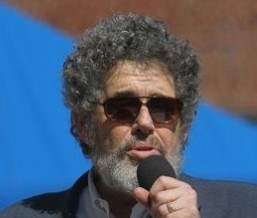“I work actively defending Israel in a number of organizational settings, especially interfaith, human rights, and peace. There is a lot of disappointment and discomfort with Israel in such places.”
The Interviewee – Rabbi Philip J Bentley. Born in 1945. Grew up in Chicago and Skokie. Attended Shimer College (a small Great Books school, 1963-66); the University of Manitoba (to study with Zalman-Schachter-Shalomi, 1966-67); and HUC-JIR (NYC, 1968-73). I have served congregations in several places. I am a life-long peace and human -rights activist. Married 47 years; two sons; one grandson.
In your opinion, what importance, if any, does the existence of a Jewish state have to you personally and to Jewish people in general?
“Like Yeshayahu Liebowitz (z”l) I consider nationalism a form of idolatry. Israel, nonetheless, holds a special place in my heart because I know my people needs its own place on the globe. I take pride in Israel’s goodness and am hurt when I think Israel does not live up to its founders ideals.”
Do you feel committed in some way to defend the future existence of Israel?
“I work actively defending Israel in a number of organizational settings, especially interfaith, human rights, and peace. There is a lot of disappointment and discomfort with Israel in such places.”
Do you affiliate yourself with a specific denomination in Judaism? What is your view regarding the dominance of the Orthodox denomination in Israel religious establishment?
“I am a Reform Rabbi, but consider myself post-denominational. I strongly oppose the interference of government and religion in each other’s affairs, but I believe that faith has a vital role in pushing for good national behavior. The role that religious parties play in Israeli politics I regard with very great disfavor. If the Chief Rabbinate cannot keep itself out of politics, it should be abolished.”
Do you feel morally responsible for Israel’s actions (such as its management of the Israeli-Palestinian conflict)?
“I do. Israel claims to represent world Jewry and I have subscribed to the Biltmore Program (the five points) which includes that. Therefore I feel I have a stake in how Israel deals with human rights and peace issues and not just as regards Palestinians.”
In your opinion, what is the main thing Israelis fail to understand about the reality of being Jewish outside of Israel?
“I think most Israelis who did not come to Israel as adult ‘Olim’, have a poor understanding of what it is to be a Jew outside of Israel.”
How would you describe Israel’s policy (formally and in practice) regarding its relationship with the Diaspora?
“Israel takes far too much for granted. The time has passed when diaspora Jews automatically fall in line and either ignore or go silent on problems. When I was a pulpit rabbi I noted that the Jewish Agency and other bodies provided no quality educational materials, films, etc. At least one consul-general sent to New York by Netanyahu back in his first term as PM had very little understanding of Jews in America. In fact his English was poor. A colleague told me Netanyahu sent his ‘so American Jews could see what a real Israeli is like.’
“Netanyahu and other Likud leaders come to this country (USA) and meet almost exclusively with Jews who are on the political right and, in fact, spend a lot of time with the Christian right. AIPAC is not really representative of American Jewry.”
In your opinion, does Israel have an obligation to defend and help Jewish communities in need?
“All Jews have this obligation. That includes Israel. I should mention that I regarded Abie Nathan as a hero. Israel has also an obligation, on which it sometimes has had a very good record, on helping non-Jews in crisis and need. Israel can play an important role for isolated and endangered Jewish communities.”
Have you ever been to Israel? if you have, can you summarize your impression from the Israeli reality?
“My first trip was not until 1981 despite wanting to go since my teens (in the 1960s). My observation is that Israel is a nation in constant flux. Much of the mood changes from one visit to the next. I know Israel as a real place and not a kind of Jewish Disneyland (the impression of most tourists, I suspect).
“When visiting I try to get with as many people and as many different kinds of people as possible. I am currently organizing a tour for next year which will be interfaith and will consist mostly of visits with various communities and projects in Jerusalem and Haifa.”
Can you tell us a bit about the Jewish community in your hometown? Is it organized? Are there community activities?
“I live in a small town with one synagogue, which was my pulpit until retirement. This town is regarded as one of the best places in America to retire to so most of the congregation is near or at retirement age and most of them are recent transplants to this area. We are half an hour away from a small city which has a JCC, two congregations, and a Chabad House. The university there has excellent Jewish programming for adults.”
Is there a question you feel should be added to the project’s questionnaire?
“Do you feel that your voice, as a Diaspora Jew, has a place in Israeli society?”

